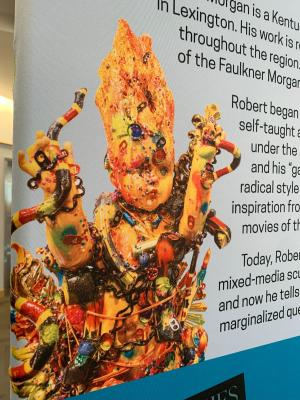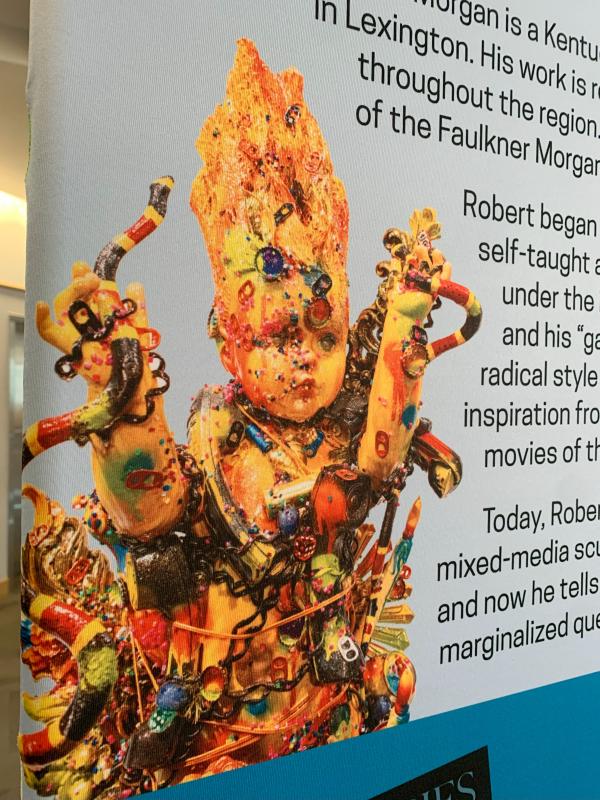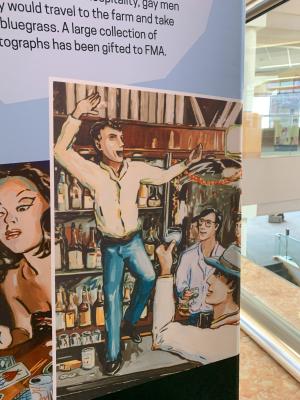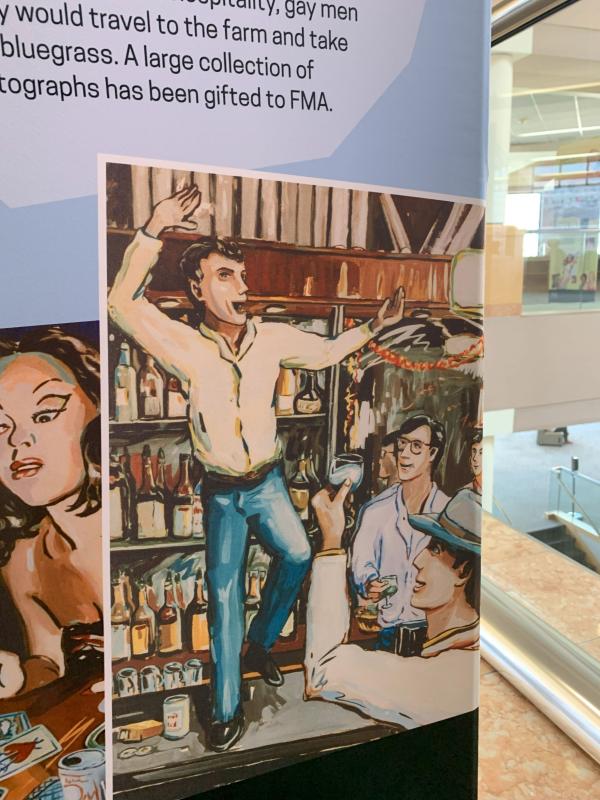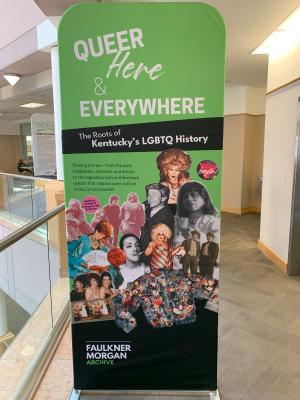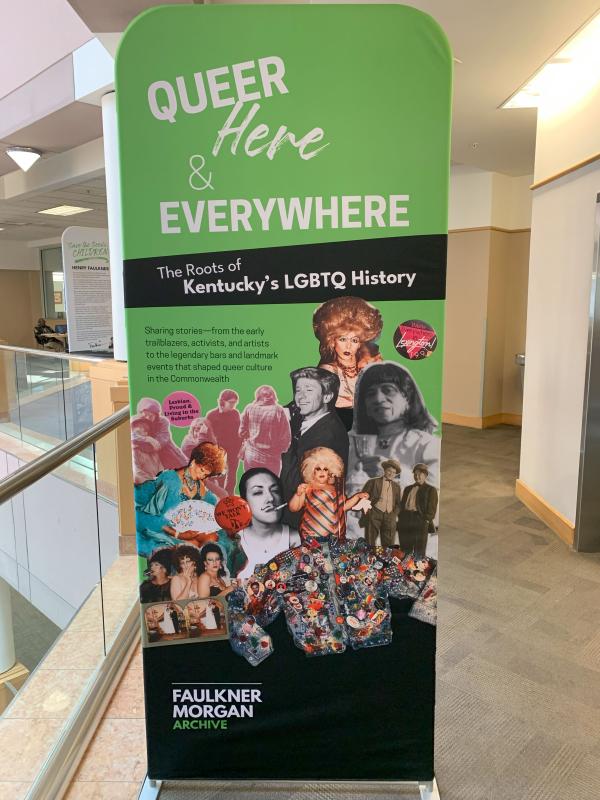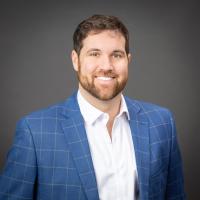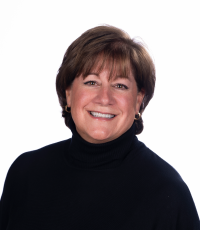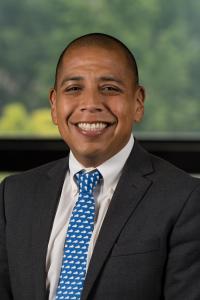
Website Search
Lexington, Kentucky (March 9, 2022) – Lexington Public Library and Lexington Public Library Foundation are honored to announce that the Marksbury Family Foundation has committed the lead gift for the capital campaign to rebuild the library branch at the corner of Versailles Road and Village Drive. In recognition of their generosity, the new facility will be named the Marksbury Family Branch when it opens in 2024.
Queer, Here, & Everywhere: The Roots of Kentucky’s LGBTQ History is the first comprehensive exhibition of Lexington’s LGBTQ history, showcasing the importance of the queer community in this city
Highlighting key moments and figures in Lexington's LGBTQ history, from Sweet Evening Breeze's drag performances in the 1920s to the passage of the Fairness Ordinance in 1999, this exhibit celebrates the resilience and contributions of the queer community. By shedding light on these often overlooked narratives, we hope to foster a greater sense of belonging for LGBTQ individuals in Lexington while also promoting understanding and appreciation among the broader population.
Learn more about this exhibit here.
The diary (ca. 1899) of Katherine Pettit, details her settlement work for the Kentucky Confederation of Women's Clubs, made yearly trips to Hazard during this period and was a central figure in establishing the Hindman (Kentucky) Settlement School in 1902. Activities described here include teaching, reading, cooking, and hygiene. The diary also includes daily entries (August 3-September 13) detailing Pettit's travel from Lexington and Hazard with fellow settlement workers, her encounters with Hazard and mountain families, and the general scope of her work. Also includes a manuscript map of her camp.
The Lexington Weekly Press was published every Wednesday in Lexington, Kentucky, and contained local, state, and foreign news. The paper focused on Central Kentucky’s “agriculture, manufactures and fine stock”, as well as literary and scientific news, market reports, and serial stories. Local weddings, deaths, community events, and elections for Lexington and the surrounding region. The paper was sent anywhere in the United States at a cost of one dollar per year.
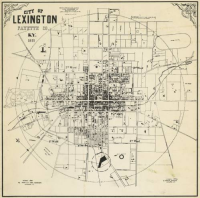
A born-and-raised Lexingtonian, Hunter attended Lexington Catholic High School and graduated with a B.S. in Economics from the University of Kentucky Gatton College of Business and Economics in 2015. He is currently a Senior Associate at BC Wood Properties, a commercial real estate investment company, where he manages 1.8 million square feet of commercial space throughout six states. Hunter has a passion for community involvement, serving on various boards for the Explorium of Lexington, United Way of the Bluegrass, University of Kentucky DanceBlue Marathon, and Make-A-Wish Kentucky.
This is a test page.
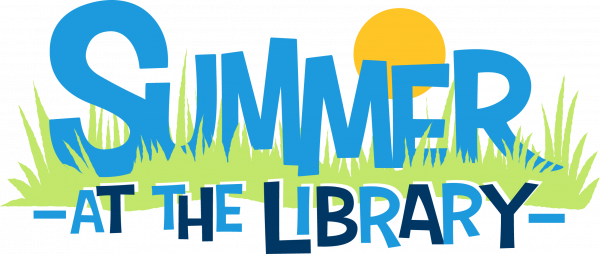
Text
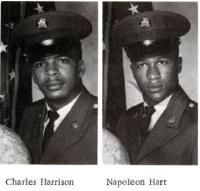
The United States Army Armor School began in 1940 as the Armored Force School and Replacement Center at Fort Knox, Kentucky.
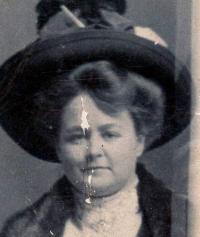
Tina Belle Green Winters Simpler Young (1880-1930), was born in Elmville, Kentucky. Known as Tiny, she was believed to be a sex worker in the 1920s and 30s, and sent $5.00 a week home to support her sister.
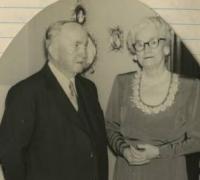
Alex Garcia is originally from Los Angeles, California. He attended the University of Kentucky in 2004 and graduated with a Bachelor of Arts degree in Psychology in 2008. He then attended the University of Kentucky College of Law and earned his law degree in 2012. After graduating from law school, he began his legal career working at the Fayette Commonwealth’s Attorney Office prosecuting serious felony crimes such as murder, robbery, kidnapping, and assault.

Lena Hart Tobey (1869-1939) was born in Mississippi to Thomas and Susan Watson Hart. In the 1890s, she attended school in Lexington, Kentucky. She married Ellis Tobey in 1896 and died in 1939 in Arkansas.
Description coming soon.
These tours are guided audio walking tours with a variety of topics focused on Downtown Lexington, KY. Music will play in between each stop, and the listener can pause the track while walking between stops.
Want to learn about new tours as they become available? Subscribe to our Genealogy & Local History newsletter.
The Kentucky Farmer is the newspaper of the Kentucky State Agricultural Society, reporting on matters of agriculture, manufacturing and commercial interests in Kentucky. It was published in Frankfort and Lexington from August 12, 1837 to sometime in 1842, possibly beyond.
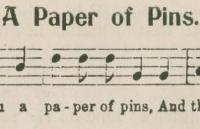
Mountain Ballads for Social Singing contains 15 songs selected for the Vesper Hour gatherings at Berea College.
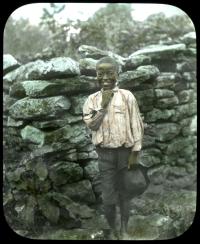
Elmer L. Foote served as official photographer of the Cincinnati Public Library for many years, and produced photographs that appeared in the Cincinnati Commercial Tribune during the early years of the twentieth century.
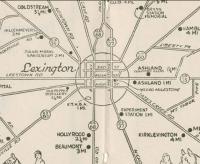
The Kentucky Room's collections contain Lexington's residential directories going back over 200 years, and are some of the most useful resources for researchers looking for family information, neighborhood histories, and house histories.
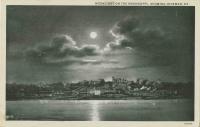
The Knowles Postcard Collection contains images of notable Kentucky locations, such as Ashland, Keeneland, and Mammoth Cave, as well as county courthouses, farms, schools, and many others.
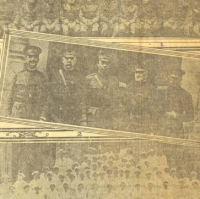
The Council of Defense books contain records for Fayette County’s Army soldiers, Navy sailors, Marines, and Army nurses in World War I, and include information regarding the person’s residence, birth place and date, specific units and en
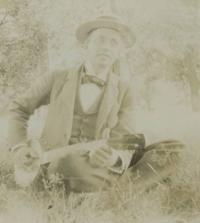
Major Henry Clay McDowell purchased the Ashland Estate from Kentucky University in 1882 with his wife, Anne Smith Clay McDowell, who was a granddaughter of Henry Clay. The McDowells took great care to revive the grounds to their fo
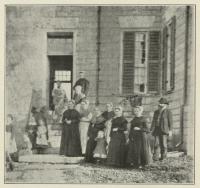
Shaker Village of Pleasant Hill has existed outside of Harrodsburg for over 200 years, and is a popular site to visit today.
The Lexington Public Library offers an Interlibrary Loan (ILL) service which allows cardholders in good standing to borrow books and receive copies of articles we do not own and cannot purchase. Our borrowing network includes over 4,000 participating public and academic libraries.
Library meeting rooms are available for individuals, non-profit, for profit, study groups, and community organizations seeking to hold meetings, trainings, and workshops. Meeting rooms are free of charge. Sterno and other tools/equipment that have an open flame are prohibited.

